- Home
- Libba Bray
The Best Science Fiction and Fantasy of the Year Volume 6 Page 12
The Best Science Fiction and Fantasy of the Year Volume 6 Read online
Page 12
When a governor wants an official record of your conversation, you’re fucked.
[What can I do for you?] I typed back.
[Someone stopped by to talk to you,] she went on, the lines spooling out over the screen in realtime. [About your not being authorized to engage in diplomatic action.]
I had expected that to be defused, not to escalate. Escalating up to the Prime Governor had been right out. [I still believe that I wasn’t engaging in diplomatic—] I started, but she typed right over it.
[How would you like authorization?]
That hadn’t been on the list of possibilities, either.
[I’m sorry?] I typed. What I almost typed, and might have typed if I didn’t value my civil liberties, was I recycle shit for a living. My skillset is not what you’re looking for.
[You may be aware that we’re pioneering a new focus of study into the Vosth,] the Governor typed.
Vosth research. I wondered if Endria had recommended me upward. [Yes, ma’am,] I wrote.
[We now believe that we can reverse the effects of Vosth colonization of a human host.]
I looked at my water. I looked at my boots. After a moment, I typed [Ma’am?] and got up for another glass. I needed it.
I came back to a paragraph explaining [You’ve been in contact with one of the infested colonists. We’d like you to bring him back to the compound for experimentation.]
OK. So long as I was just being asked to harvest test subjects. [You want to cure Menley?]
[We believe it unlikely that human consciousness would survive anywhere on the order of years,] she typed back, and my stomach twisted like it had talking to Menley. [This would be a proof of concept which could be applied to the more recently infected.]
And Menley wasn’t someone who’d be welcomed back into the colony, I read between the lines. I should’ve asked Endria who had sat on the council that decided Menley’s sentence. Was this particular Prime Governor serving, back then? Why did I never remember these things? Why did I never think to ask?
[So, you would extract the Vosth,] I started, and was going to finish leaving a corpse?, maybe hoping that we’d at least get a breathing body. She interrupted me again.
[The Vosth parasite organisms would not be extracted. They would die.]
My mouth was dry, but the idea of drinking water made me nauseous. It was like anyone or anything in Menley’s body was fair game for anyone.
[I want to be clear with you,] she said. Dammit. She could have just lied like they did in every dramatic work I’d ever read. Then, if the truth ever came out, I could be horrified but still secure in the knowledge that there was no way I could have known. No. I just got told to kidnap someone so the scientists could kill him.I wasn’t even saving anyone. Well, maybe in the future, if anyone got infested again.
Anyone the governors felt like curing, anyway.
Then she had to go and make it worse.
[We would not be in violation of any treaties or rules of conduct,] she wrote. [If we can develop a cure for or immunity to Vosth infestation, the de facto arrangement in place between our colony and the Vosth will be rendered null, and the restrictions imposed on our activities on the planet will become obsolete.]
I wished Endria was there. She could interpret this. [Isn’t this an act of war?]
[We’re confident that the Vosth will regard an unwarranted act of aggression as an expression of natural law,] the Governor explained.
That didn’t make me feel better, and I think it translated to yes. [I thought it was understood that things like that wouldn’t happen.]
[It was understood that the dominant species could, at any time, exercise their natural rights,] the Governor explained. [Perhaps it’s time they learned that they aren’t the dominant species any more.]
We believe the ambient temperature to be pleasant for human senses today,Vosth-Menley told me when I got to the Ocean of Starve. I was beginning to wonder whether his reassurances were predation or a mountain of culture skew.
“What is your obsession with me feeling the air?” I asked him. Them. The Vosth.
You would be safe, Vosth-Menley insisted.
I should have asked Endria if the Vosth could lie. I should have kept a running list of things I needed to ask. “Listen,” I said.
We would like to understand, Vosth-Menley said again.
I read a lot of Earth lit. I’d never seen a butterfly, but I knew the metaphor of kids who’d pull off their wings. Looking at Menley, I wondered if the Vosth were like children, oblivious to their own cruelty. “What would you do if someone could take you over?”
Our biology is not comparable to yours, Vosth-Menley said.
Bad hypothetical. “What would you do if someone tried to kill you?”
It is our perception of reality that species attempt to prolong their own existence, he said.
“Yeah.” I was having trouble following my own conversation. “Look, you’re a dominant species, and we’re supposed to have a reciprocal relationship, but you take people over and—look.” I’d gone past talking myself in circles and was talking myself in scatterplots.
The back of my neck itched, and I couldn’t ignore it.
“What if I do want to take off my suit?” I asked, and then scatterplotted, “Do you have any reason to lie to me?”
The Vosth considered. Yes.
Oh. OK. Great.
Our present actions are concurrent with a different directive, he added. There is reason to establish honesty.
Nothing was stopping him from attacking. He could have torn off my suit or helmet by now. Even if it was a risk, and it was a risk, and even if I had a phobia the size of the meteorite the Vosth had ridden in...
I’d seen how many Vosth had swarmed over Menley’s whole body, and how long it had taken him to stop twitching. If it was just a few of them, I might be able to run back to the compound. Then, if the governors really had a cure, they could cure me. And I’d feel fine about tricking the Vosth into being test subjects if they’d tricked me into being a host. That’s what I told myself. I didn’t feel fine about anything.
I brought my gloves to the catch on my helmet.
Two minutes later I was still standing like that, with the catch still sealed, and Vosth-Menley was still staring.
“You could come back to the compound with me,” I said. “The governors would love to see you.”
We are curious as to the conditions of your constructed habitat, Vosth-Menley said.
Yeah, I thought, but are you coming back as a plague bearer or an experiment?
I squeezed my eyes shut, and pried my helmet off.
I’d lost way too many referents.
The outside air closed around my face with too many smells I couldn’t identify or describe, other than “nothing like sterile air” and “nothing like my room or my shower.” Every nerve on my head and neck screamed for broadcast time, registering the temperature of the air, the little breezes through the hairs on my nape, the warmth of direct sunlight. My heart was racing. I was breathing way too fast and even with my eyes shut I was overloaded on stimuli.
I waded my way through. It took time, but amidst the slog of what I was feeling, I eventually noticed something I wasn’t: anything identifiable as Vosth infestation.
I opened my eyes.
Vosth-Menley was standing just where he had been, watching just as he had been. And I was breathing, with my skin touching the outside air.
Touching the air. That which touched the air belonged to the Vosth. I wasn’t belonging to the Vosth.
I looked toward the Ocean. Its silver underlayer was still there, calm beneath the surface.
I took a breath. I tasted the outside world, the gas balance, the smell of vegetation working its way from my nostrils to the back of my throat. This was a Vosth world, unless the governors made it a human world, and I wasn’t sure how to feel about that. Looking back to Vosth-Menley, I didn’t know how he’d feel about it either.
“Y
ou came from beyond the shell of atmosphere,” I said. “Like we did, right?”
Vosth-Menley said, Our genetic predecessors came to this world on an meteorite.
“And you adapted, right?” I almost ran a hand over my helmet, but stopped before I touched my hair. I hadn’t sterilized my gloves. Never mind that my head wasn’t in a sterile environment anymore either. “Do you understand that we adapt?”
It is our perception of reality that living organisms adapt, he said.
That was a yes. Maybe. “Look, we don’t have to fight for dominance, do we?” I spread my hands. “Like, if you go off and re-invent technology now that you have hands to build things with, you don’t need to come back here and threaten us. We can have an equilibrium.”
His eyes were as dead as usual. I had no idea what understanding on a Vosth colonist would look like.
“We’d both be better.”
We are not averse to an equilibrium, Vosth-Menley said.
I swallowed. “Then you’ve gotta go now.” Then, when I thought he didn’t understand, “The governors are adapting a way to cure you. To kill you. Making us the dominant species. Look, I’m... telling you what will happen, and I’m giving you the option not to let us do it.”
Vosth-Menley watched me for a moment. Then he turned, and walked back toward the Ocean of Starve.
Interspecies incident, said a little voice at the corner of my mind. It sounded like Endria. Sterile or not, I sealed my helmet back onto my e-suit and walked back toward the colony at double-time.
That night I filed a report saying that I’d invited Vosth-Menley back, but he’d declined for reasons I couldn’t make sense of. Communications barrier. I thought of telling the Prime Governor that she should have sent a diplomatic auditor, but didn’t.
I didn’t hear anything until the next day when a survey buggy came back in, and its driver hopped down and said that something strange happened at the Ocean of Starve. Far from being its usual murky silver, it was perfectly clear and reflecting the sky. He said it to a governor, but news spread fast. It came to me via Endria as I was walking out of my lab.
“The only thing that would cause that would be a mass migration of the Vosth, but that’s not something we’ve seen in their behavior before now!” She glared at me like I might know something, which, of course, I did.
A diplomatic auditor came by later to take a complete transcript of my last interaction with Vosth-Menley. I left most of it out.
Survey buggies kept going out. People walked down to the Ocean shore. Auditors flashed radio signals out of the communications booth, but no one answered. The Vosth had vanished, and that was all anyone could tell.
I stopped wearing my envirosuit.
The first day, stepping out of my door, I felt lightbodied, lightheaded, not entirely there. I felt like I’d walked out of my shower without getting dressed. I had to force myself to go forward instead of back, back to grab my envirosuit, to make myself decent.
I walked into the hall where every moment was the sensory overload of air on my skin, where my arms and legs felt loose, where everyone could see the expressions on my face. That was as frightening as the Vosth. I’d just left behind the environmental advantage I’d had since I was ten.
But I was adapting.
What We Found
Geoff Ryman
Geoff Ryman is the author of The Warrior Who Carried Life, the novella “The Unconquered Country”, The Child Garden, Was, Lust, and Air. His work 253, or Tube Theatre was first published as hypertext fiction. A print version was published in 1998 and won the Philip K. Dick Memorial Award. He has also won the World Fantasy Award, Campbell Memorial Award, the Arthur C Clarke Award (two times), the British Science Fiction Association Award (once for novel, twice for short fiction), the Sunburst Award, The James Tiptree Award, and Gaylactic Spectrum awards. His most recent novel, The King’s Last Song, is set in Cambodia, both at the time of Angkorean emperor Jayavarman VII, and in the present period. He has recently edited When it Changed a collection of commissioned collaborations between writers and scientists. He currently lectures in Creative Writing at the University of Manchester in the United Kingdom.
Can’t sleep. Still dark. Waiting for light in the East.
My rooster crows. Knows it’s my wedding day. I hear the pig rooting around outside. Pig, the traditional gift for the family of my new wife. I can’t sleep because alone in the darkness there is nothing between me and the realization that I do not want to get married. Well, Patrick, you don’t have long to decide.
The night bakes black around me. Three-thirty a.m. In three hours, the church at the top of the road will start with the singing. Two hours after that, everyone in both families will come crowding into my yard.
My rooster crows again, all his wives in the small space behind the house. It is still piled with broken bottles from when my father lined the top of that wall with glass shards.
That was one of his good times, when he wore trousers and a hat and gave orders. I mixed the concrete, and passed it up in buckets to my eldest brother, Matthew. He sat on the wall like riding a horse, slopping on concrete and pushing in the glass. Raphael was reading in the shade of the porch. “I’m not wasting my time doing all that,” he said. “How is broken glass going to stop a criminal who wants to get in?” He always made me laugh, I don’t know why. Nobody else was smiling.
When we were young my father would keep us sitting on the hot, hairy sofa in the dark, no lights, no TV because he was driven mad by the sound of the generator. Eyes wide, he would quiver like a wire, listening for it to start up again. My mother tried to speak and he said, “Sssh. Sssh! There it goes again.”
“Jacob, the machine cannot turn itself on.”
“Sssh! Sssh!” He would not let us move. I was about seven, and terrified. If the generator was wicked enough to scare my big strong father, what would it do to little me? I keep asking my mother what does the generator do?
“Nothing, your father is just being very careful.”
“Terhemba is a coward,” my brother Matthew said, using my Tiv name. My mother shushed him, but Matthew’s merry eyes glimmered at me: I will make you miserable later. Raphael prized himself loose from my mother’s grip and stomped across the sitting room floor.
People think Makurdi is a backwater, but now we have all you need for a civilized life. Beautiful banks with security doors, retina ID, and air conditioning; new roads, solar panels on all the streetlights, and our phones are stuffed full of e-books. On one of the river islands they built the new hospital; and my university has a medical school, all pink and state-funded with laboratories that are as good as most. Good enough for controlled experiments with mice.
My research assistant Jide is Yoruba and his people believe that the grandson first born after his grandfather’s death will continue that man’s life. Jide says that we have found how that is true. This is a problem for Christian Nigerians, for it means that evil continues.
What we found in mice is this. If you deprive a mouse of a mother’s love, if you make him stressed through infancy, his brain becomes methylated. The high levels of methyl deactivate a gene that produces a neurotropin important for memory and emotional balance in both mice and humans. Schizophrenics have abnormally low levels of it.
It is a miracle of God that with new generation, our genes are knocked clean. There is a new beginning. Science thought this meant that the effects of one life could not be inherited by another.
What we found is that high levels of methyl affect the sperm cells. Methylation is passed on with them, and thus the deactivation. A grandfather’s stress is passed on through the male line, yea unto the third generation.
Jide says that what we have found is how the life of the father is continued by his sons. And that is why I don’t want to wed.
My father would wander all night. His three older sons slept in one room. Our door would click open and he would stand and glare at me, me particularly, with a boggled and distrac
ted eye as if I had done something outrageous. He would be naked; his towering height and broad shoulders humbled me, made me feel puny and endangered. I have an odd-shaped head with an indented V going down my forehead. People said it was the forceps tugging me out: I was a difficult birth. That was supposed to be why I was slow to speak, slow to learn. My father believed them.
My mother would try to shush him back into their bedroom. Sometimes he would be tame and allow himself to be guided; he might chuckle as if it were a game and hug her. Or he might blow up, shouting and flinging his hands about, calling her woman, witch, or demon. Once she whispered, “It’s you who have the demon; the demon has taken hold of you, Jacob.”
Sometimes he shuffled past our door and out into the Government street, sleeping-walking to his and our shame.
In those days, it was the wife’s job to keep family business safe within the house. Our mother locked all the internal doors even by day to keep him inside, away from visitors from the church or relatives who dropped in on their way to Abuja. If he was being crazy in the sitting room, she would shove us back into our bedroom or whisk us with the broom out into the yard. She would give him whisky if he asked for it, to get him to sleep. Our mother could never speak of these things to anybody, not even her own mother, let alone to us.
We could hear him making noises at night, groaning as if in pain, or slapping someone. The baby slept in my parents’ room and he would start to wail. I would stare into the darkness: was Baba hurting my new brother? In the morning his own face would be puffed out. It was Raphael who dared to say something. The very first time I heard that diva voice was when he asked her, sharp and demanding, “Why does that man hit himself?”
My mother got angry and pushed Raphael’s face; slap would be the wrong word; she was horrified that the problem she lived with was clear to a five-year-old. “You do not call your father ‘that man’! Who are you to ask questions? I can see it’s time we put you to work like children used to be when I was young. You don’t know what good luck you had to be born into this household!”

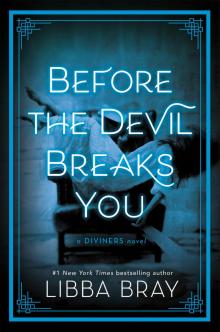 Before the Devil Breaks You
Before the Devil Breaks You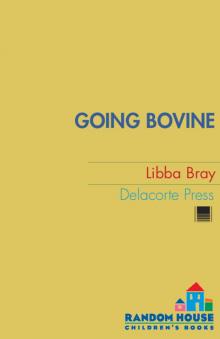 Going Bovine
Going Bovine A Great and Terrible Beauty
A Great and Terrible Beauty Rebel Angels
Rebel Angels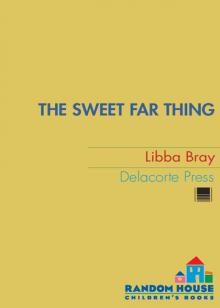 The Sweet Far Thing
The Sweet Far Thing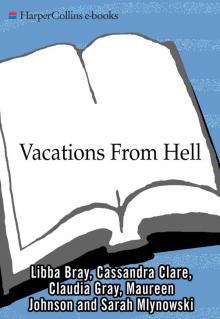 Vacations From Hell
Vacations From Hell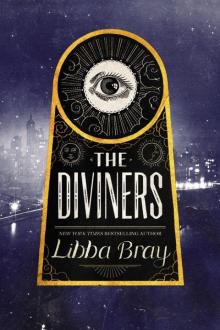 The Diviners
The Diviners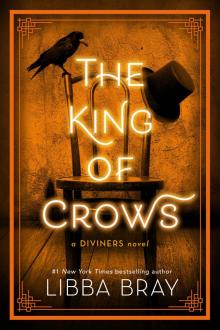 The King of Crows
The King of Crows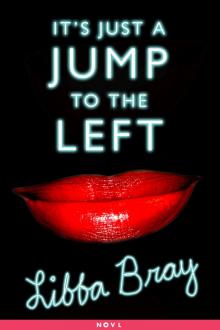 It's Just a Jump to the Left
It's Just a Jump to the Left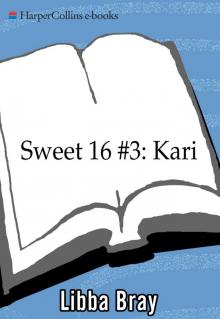 Kari
Kari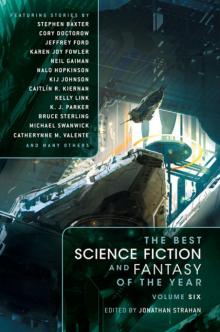 The Best Science Fiction and Fantasy of the Year Volume 6
The Best Science Fiction and Fantasy of the Year Volume 6